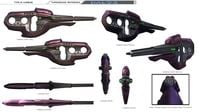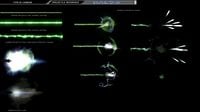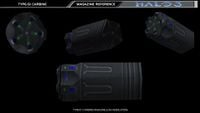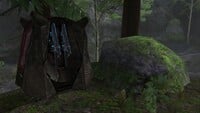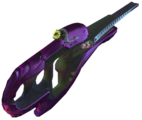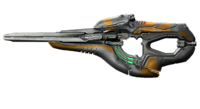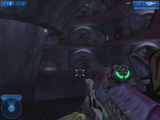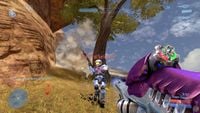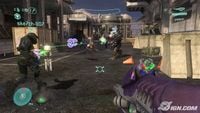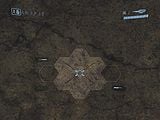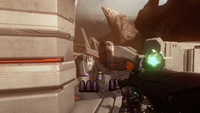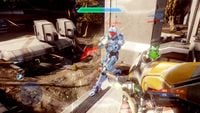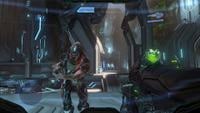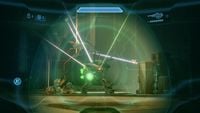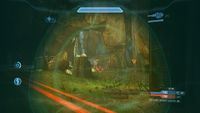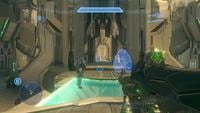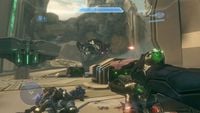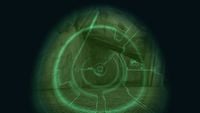Vostu-pattern carbine: Difference between revisions
From Halopedia, the Halo wiki
| Line 131: | Line 131: | ||
File:H4-SO-S1E6-T51CovCarbine-02.jpg|Another view of the Type-51 Carbine being wielded in ''Halo 4'''s ''Spartan Ops''. | File:H4-SO-S1E6-T51CovCarbine-02.jpg|Another view of the Type-51 Carbine being wielded in ''Halo 4'''s ''Spartan Ops''. | ||
File:H4 FUD Silva with Carbine.jpg|[[Chyler Silva]] using a Type-51 Carbine at [[Corbulo Academy of Military Science]]. | File:H4 FUD Silva with Carbine.jpg|[[Chyler Silva]] using a Type-51 Carbine at [[Corbulo Academy of Military Science]]. | ||
File:Carbinehud.jpeg| A render of the Halo 4 era carbine's scope. | |||
</gallery> | </gallery> | ||
Revision as of 13:42, April 3, 2013
| This article does not meet the wiki's general standards and/or standards on layouts. You can help by cleaning this article. |
Template:Article Quote The Type-51 Carbine[1], also known as the Covenant Carbine, is a Covenant infantry firearm. Created and commonly used by the Sangheili, it is also carried by Kig-Yar and Jiralhanae.
Overview
The Type-51 Carbine was designed by the Iruiru Armory on Sanghelios, based on marksman rifles used earlier in the Sangheili's war-dominated history.[2] Although it may seem as an oddity as most Covenant technology is energy-based, the Covenant use several other solid projectile-based weapons.[3] The T51 is frequently used by Sangheili of various ranks, though its most prominent use is among Kig-Yar marksmen, who often utilize the weapon as an effective tool for sharpshooting and assassination.[1] After the Great Schism Jiralhanae infantry were often deployed with this weapon.[4] Though it was encountered as early as 2526[5] and was seen occasionally during the Human-Covenant War,[6] it was not properly cataloged by the Office of Naval Intelligence until 2551. This was likely due to the similar role and performance of the Type-31 Rifle, which was seemingly overshadowed by the Type-51 in the later years of the war.
Design details
The Type-51 Carbine is a recoil-operated and charger-fed, semi-automatic marksman rifle. It serves as medium to long-range weapon utilized by Covenant forces. The weapon's cylindrical magazine holds 18 rounds,[3][2] and also provides indication of number of rounds left in the magazine by utilizing a holographic display.[2] The back end of the weapon contains two circular openings, the forward one is the weapon's hand guard and the area in front of it is where the weapon's trigger is located. On the weapon's top rail is the magazine well and ammunition chamber,[2] next to it is a hammer like device which springs back when the weapon is fired. The forward part of the weapon contains the Type-51 Carbine's barrel, which controls the rapid acceleration of the projectile out at a high velocity.
Ammunition
The Type-51 Carbine marks itself as unique among Covenant firearms by its ammunition. Rather than using plasma bursts which can be inaccurate and slow at long range,[1] this weapon utilizes caseless radioactive projectiles, this ammunition can come in a number of compositions, but the Covenant primarily employ an extremely toxic compound mined from a radioactive moon in the Sangheili's star system.[2] The T-51 rifle can fire this projectile at supersonic speeds,[1] when fired, the round, which is coated in a shielded material[2] is accelerated to a speed anywhere from Mach 1 to Mach 5, traveling downrange at 2,296 feet per second.[2] The round is powered along its entire flight path, consuming up to 50% of its total mass by the time it reaches its maximum effective range.[3] The T-51 ballistic round can stop a target at up to six hundred and fifty yards.
Against light armored targets, the rounds' supersonic speed and super-heated nature ensures armor penetration on either the first or second impact. Impacts to the flesh can vary dependent upon range and speed - a single round impacting flesh at close range will penetrate deep into the target, and can nick bone. The kinetic energy from the impact of a round at close range can knock back an individual.[7] Two rounds that impact the same area at close range will pass through the target easily. Upon impact the round releases a toxic material into a victims bloodstream,[2] in addition to radiation burns the victim suffers. The chance of survivability of being hit from the T-51 rifle is low. If the round has not struck a vital organ the victim only has a few minutes before the toxic chemicals kill the victim unless it is treated immediately.[2] In most circumstances a surviving victim will require attentive treatment to ensure survivability.
Advantages
The Type-51 Carbine, with its 2x zoom ability is an excellent ranged weapon. Its accuracy and performance in the field makes it a up front choice for infantry who are required to engage enemy infantry at medium range. Its fast rate of fire is useful against more heavily armored infantry and is able to disable any type of infantry energy shield system including Jiralhanae Power Armor, Jackal Point Defense Gauntlets or Stationary Shield Generators. The Type 51 Carbine also fits the role of a marksman weapon, as it can be used to take out a target from medium range - this with the added bonus of low noise emission allows the carbine to perform multiple roles in the field.
Disadvantages
The ballistic round give off a light green trail, giving away the position of the shooter, a trait similar to the Type-50 Sniper Rifle System. Its distinct sound at close to medium range may also attract the attention of nearby enemy infantry. Its firepower when compared to the human infantry counterpart the Battle Rifle, is stronger, yet slightly less accurate. It still has the ability to take down almost any target. The Type-51, if fired too fast becomes inaccurate, making it harder for the shooter to take down a target. Its magazine is also relativity small and may not be enough and when faced with infantry with energy shielding it will require almost an entire clip to eliminate the target unless aimed at weak spots on the armor or energy shield systems.
Changes among games
Changes from Halo 2 to Halo 3
- In Halo 2, when the players uses the scope, the view is a group of seven hexagons melded into a honeycomb shape. In Halo 3, four lines will separate from the center in addition to the hexagons, almost on the same plane as the reticule lines.
- In Halo 3, the Carbine has a green patterned circle on top of the magazine indicator.
- Carbine ammo is much more abundant, double the amount usually given in Halo 2.
- Improved design, including more polygons and better textures.
- New sound effects for the carbine.
- The power has been reduced slightly from its Halo 2 counterpart. It now takes eight shots to kill a fully-shielded opponent in multiplayer, presuming the last shot is to the head, as opposed to seven shots in Halo 2.
- In addition to the reduction in per-shot damage, the Carbine also starts with two spare magazines when found in multiplayer, whereas it only started with a single spare magazine in Halo 2 multiplayer.
- Emits a small cloud of gas when reloading.
Changes from Halo 3 to Halo 4
- The weapon is now colored dark blue with light blue trim rather than purple with green trim.
- However, in recent gameplay images, it is seen with an indigo and green color scheme.
- The ammo counter now resembles a radar display.
- When zooming in, the color of the scope turns green instead of having no color at all like most other scoped weapons.
- The two circles located on the back of the carbine have been changed to a single irregular hexagon.
- When inserting a new magazine, a panel flips up to allow access to the receiver, rather than pushing the magazine straight down.[8] The Needle Rifle used a similar animation in Halo: Reach.
- The weapon's reticule is now a dialated version of the Needle Rifle reticule from Halo: Reach.
Tactics
Campaign
- In Halo 2 because Brutes have very little head protection, a skilled player can take out three or four Brutes with one magazine or with one shot to the head when playing on easier difficulties. Its fast rate of fire is useful to shoot off a Brute's helmet and then shoot a Brute's head in less than a second.
- In Halo 3, since Brutes have better armor, the above tactic is not as effective; however, due to the Carbine being an energy weapon and a projectile weapon, it is better at removing Brute Power Armor than the Battle Rifle.
- As with the Battle Rifle, the Covenant Carbine will easily take down Grunts from close to far range. Simply aim for the head. However, if shot at the body, it will take 4-6 shots, decreasing its effectiveness.
- If the Jackals are on patrol or have their back turned to you, simply aim for the head and pull the trigger, resulting in a one-hit kill. However, if in the middle of a firefight, you should run up towards the Jackal, melee it or shoot the exposed hand which should make it flinch and take away its shield for an instant, and kill it with a headshot. Carbine rounds will inflict damage on the Jackal's personal shield, causing the shield to collapse within 4-10 shots depending on the difficulty and providing you with a clear shot at their head. However, unlike with the plasma rifle, the damage done is not enough to actually collapse the shield with a reasonable amount of shots.
- Jackal Snipers are relatively easier than normal Jackals due to the lack of shielding, however they can be still lethal as a single shot can kill you in Legendary. To avoid it firing on you, simply shoot it at the head.
- Like the human sniper rifles in the Halo trilogy, the Covenant Carbine will leave a visible, green trail that gives away the position of the shooter. In dark or chaotic areas, this will help you determine where your enemies are.
- Due to its power, you can combine the Carbine with a Plasma Pistol that takes out shields while the Carbine will finish your enemy off.
Multiplayer
- The Carbine's magazine, though holding half as much ammo than the Battle Rifle, will last longer because the Battle Rifle fires in bursts of three, emptying a magazine with twelve pulls of the trigger. The Carbine fires one round at a time, requiring eighteen pulls of the trigger to empty a magazine.
- This is a better choice over the Battle Rifle when riding in the passenger seat of a vehicle. Since the rider cannot use the scope, the Battle Rifle's spread would cause many rounds to miss its target. A Carbine is not severely affected by this problem.
- Combine the Carbine with a Battle Rifle can continue your blitzkrieg, when you run low on ammo in one weapon, switch to the other.
- The Carbine, when used correctly, can take down an enemy slightly faster than a Battle Rifle. However, it requires more aim, taking at least seven shots to the head in Multiplayer. Damage done by the Carbine is slightly lower than that of the Battle Rifle, but it fires about twice as fast, making it almost as effective. Experienced players would prefer the Carbine over the Battle Rifle because of the constant shifting of aim required.
- Regardless of whether playing campaign or multiplayer in Halo 3, the Carbine is in fact less accurate at long range than the Battle Rifle. This is very easily seen in the campaign level Sierra 117, after the player clears out the Sniper Alley, as SgtMaj Johnson says "C'mon, you dumb apes". There are a number of Jackal Snipers in that area. Killing them at range is better done with the Battle Rifle than the Carbine due the Carbine's inability to fire perfectly straight like the Battle Rifle. Covenant AI seem unaffected by this phenomenon.
UNSC Remarks
- “So — it’s just their projectile weapons that we’ve figured out how to reload? I guess I’m cool with that.”
- “It’s almost a direct analog of the BR55. I just wish it had a more — um — conventional scope.”
- “In my youth I used to board Olympus a couple o’ times a year—you see where I’m going with this? Yeah. That foxtrot gun is the size of my old board.”
- “Oh man! You really need to learn to recognize the symbols on top of the charger—and count your shots, too. First time I picked one up I just about brained myself when it ejected.”
- “Wish it was smaller; wish it had a proper stock—or at least a butt pad.”
- "Hey — don’t inhale immediately after the charger ejects. I heard that shit will give you Boren’s Syndrome." (There are no conclusive tests that indicate that the Type 51-Carbine put the user at risk for contracting Boren's syndrome.)
Trivia
- In the Halo 2 and Halo 3 instruction booklets, the Carbine is incorrectly labeled as having 36 rounds, instead of the actual 18 rounds. This is actually the number of rounds the Carbine's human equivalent, the Battle Rifle, has.
- In Halo 2, on the level Sacred Icon, there is a glitch where the player starts off with 78 spare rounds instead of the usual 72. However, if the player empties the magazine and then try and pick up Carbine ammo, the player will only be able to get a total of the usual 72 spare rounds.
- A number of Covenant Carbines have more spare ammo than normally allowed on the Halo 2 level Sacred Icon.
- On the Halo 2 campaign level Gravemind, several Carbines have 120 rounds in reserve, much more than the usual max, 72. This also occurs on other levels, especially if the Carbine is taken from an ally scripted to pick the weapon up, such as the Marines in the detention block in Gravemind.
- If the player gives a shield-bearing Jackal a Carbine in Halo 2 and then melee it, it will drop the Carbine and pull out a Plasma Pistol. This is done for the Unlimited Plasma Pistol Glitch.
- In Halo 2, when reloaded, the Covenant Carbine's magazine will pop out but disappear almost immediately. In Halo 3 they will fall on the floor and take a short while to disappear.
- In the Halo Wars official strategy guide, the Covenant Carbine is called a "slug beam rifle", probably because it fires radioactive rounds at rather high velocities and at long ranges.
- The designer's idea of the Type-51 self-ejecting the spent magazine might have come from the WWII-era M1 Garand's en-bloc clip.
- In Halo 3: ODST, the Carbine has a different firing sound, sounding much deeper than before. Also in Halo 3: ODST, if fired long enough, like the rest of the weapons, the reticle will start moving up. This is likely the result of the player character being an Orbital Drop Shock Trooper, instead of a SPARTAN-II or Sangheili.
- The Carbine is arguably the best non-power weapon available in ODST's Firefight mode. This is due to both the removal of the Battle Rifle from the game and the Carbine's status as a headshot-capable energy weapon, which makes its rounds immune to the adverse effects of the Tilt Skull.
- The Carbine seen in Halo 4: Forward Unto Dawn appears to be the Halo 3 iteration of the weapon, rather than the Halo 4 version. This is likely because it is probably the same prop that WETA Workshop created for Halo: Landfall.
Gallery
- H3 Covenant Carbine angle.jpg
The Halo 3 Covenant Carbine.
- 1659326241 22c84405c2 o.jpg
A carbine round being fired by a Jackal Sniper.
- Halo3 123446104 Full.jpg
Another view through the Carbine's scope.
- H4-T51CovenantCarbine-Scope.jpg
A view through the Covenant Carbine's scope in Halo 4's multiplayer.
The Master Chief wielding a Type-51 Carbine against a Sangheili Storm in Halo 4's campaign.
Aggressor Sentinels attacking a Hunter, as seen through the scope of a Type-51 Carbine wielded by the Master Chief.
Chyler Silva using a Type-51 Carbine at Corbulo Academy of Military Science.
List of appearances
- Halo 2 (First appearance)
- Halo: Uprising
- Halo 3
- Halo Wars
- Halo: Helljumper
- Halo 3: ODST
- Halo: Evolutions - Essential Tales of the Halo Universe
- Halo: Blood Line
- Halo Legends
- Halo: Combat Evolved Anniversary
- Halo 4: Forward Unto Dawn
- Halo 4
Sources
- ^ a b c d Halo Encyclopedia, page 322
- ^ a b c d e f g h i Cite error: Invalid
<ref>tag; no text was provided for refs namedEVG - ^ a b c Cite error: Invalid
<ref>tag; no text was provided for refs namedbung - ^ Halo 3
- ^ Halo 4: Forward Unto Dawn, Part 4
- ^ Halo Wars
- ^ Halo: Evolutions Midnight in the Heart of Midlothian, page 90
- ^ Halo 4 News - Full Spartan Ops Match & Promethean EMP Grenade Gameplay


